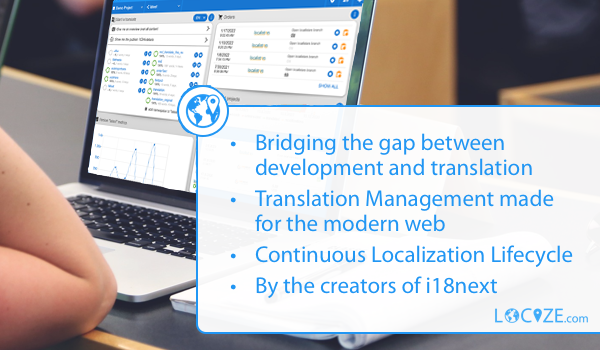@prebsch-exo/i18next-http-backend
v1.3.2-patch.1
Published
i18next-http-backend is a backend layer for i18next using in Node.js, in the browser and for Deno.
Downloads
417
Maintainers
Readme
Introduction
This is a simple i18next backend to be used in Node.js, in the browser and for Deno. It will load resources from a backend server using the XMLHttpRequest or the fetch API.
It's based on the deprecated i18next-xhr-backend and can mostly be used as a drop-in replacement.
Why i18next-xhr-backend was deprecated?
Advice:
If you don't want to manage your translation files manually or are simply looking for a better management solution, take a look at i18next-locize-backend.
Getting started
Source can be loaded via npm or downloaded from this repo.
There's also the possibility to directly import it via a CDN like jsdelivr or unpkg or similar.
# npm package
$ npm install i18next-http-backendWiring up:
import i18next from 'i18next';
import HttpApi from 'i18next-http-backend';
i18next.use(HttpApi).init(i18nextOptions);for Deno:
import i18next from 'https://deno.land/x/i18next/index.js'
import Backend from 'https://deno.land/x/i18next_http_backend/index.js'
i18next.use(Backend).init(i18nextOptions);for plain browser:
<script src="https://cdn.jsdelivr.net/npm/[email protected]/i18nextHttpBackend.min.js"></script>
<!-- an example can be found in example/jquery/index.html -->- As with all modules you can either pass the constructor function (class) to the i18next.use or a concrete instance.
- If you don't use a module loader it will be added to
window.i18nextHttpBackend
Backend Options
{
// path where resources get loaded from, or a function
// returning a path:
// function(lngs, namespaces) { return customPath; }
// the returned path will interpolate lng, ns if provided like giving a static path
// the function might return a promise
//
// If allowMultiLoading is false, lngs and namespaces will have only one element each,
// If allowMultiLoading is true, lngs and namespaces can have multiple elements
loadPath: '/locales/{{lng}}/{{ns}}.json',
// path to post missing resources, or a function
// function(lng, namespace) { return customPath; }
// the returned path will interpolate lng, ns if provided like giving a static path
addPath: '/locales/add/{{lng}}/{{ns}}',
// your backend server supports multiloading
// /locales/resources.json?lng=de+en&ns=ns1+ns2
// Adapter is needed to enable MultiLoading https://github.com/i18next/i18next-multiload-backend-adapter
// Returned JSON structure in this case is
// {
// lang : {
// namespaceA: {},
// namespaceB: {},
// ...etc
// }
// }
allowMultiLoading: false, // set loadPath: '/locales/resources.json?lng={{lng}}&ns={{ns}}' to adapt to multiLoading
// parse data after it has been fetched
// in example use https://www.npmjs.com/package/json5
// here it removes the letter a from the json (bad idea)
parse: function(data) { return data.replace(/a/g, ''); },
//parse data before it has been sent by addPath
parsePayload: function(namespace, key, fallbackValue) { return { key } },
// allow cross domain requests
crossDomain: false,
// allow credentials on cross domain requests
withCredentials: false,
// overrideMimeType sets request.overrideMimeType("application/json")
overrideMimeType: false,
// custom request headers sets request.setRequestHeader(key, value)
customHeaders: {
authorization: 'foo',
// ...
},
// can also be a function, that returns the headers
customHeaders: () => ({
authorization: 'foo',
// ...
}),
requestOptions: { // used for fetch, can also be a function (payload) => ({ method: 'GET' })
mode: 'cors',
credentials: 'same-origin',
cache: 'default'
}
// define a custom request function
// can be used to support XDomainRequest in IE 8 and 9
//
// 'options' will be this entire options object
// 'url' will be passed the value of 'loadPath'
// 'payload' will be a key:value object used when saving missing translations
// 'callback' is a function that takes two parameters, 'err' and 'res'.
// 'err' should be an error
// 'res' should be an object with a 'status' property and a 'data' property containing a stringified object instance beeing the key:value translation pairs for the
// requested language and namespace, or null in case of an error.
request: function (options, url, payload, callback) {},
// adds parameters to resource URL. 'example.com' -> 'example.com?v=1.3.5'
queryStringParams: { v: '1.3.5' },
reloadInterval: false // can be used to reload resources in a specific interval (useful in server environments)
}Options can be passed in:
preferred - by setting options.backend in i18next.init:
import i18next from 'i18next';
import HttpApi from 'i18next-http-backend';
i18next.use(HttpApi).init({
backend: options,
});on construction:
import HttpApi from 'i18next-http-backend';
const HttpApi = new HttpApi(null, options);via calling init:
import HttpApi from 'i18next-http-backend';
const HttpApi = new HttpApi();
HttpApi.init(null, options);From the creators of i18next: localization as a service - locize.com
A translation management system built around the i18next ecosystem - locize.com.

With using locize you directly support the future of i18next.


